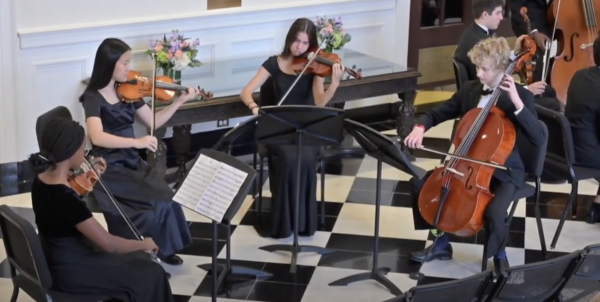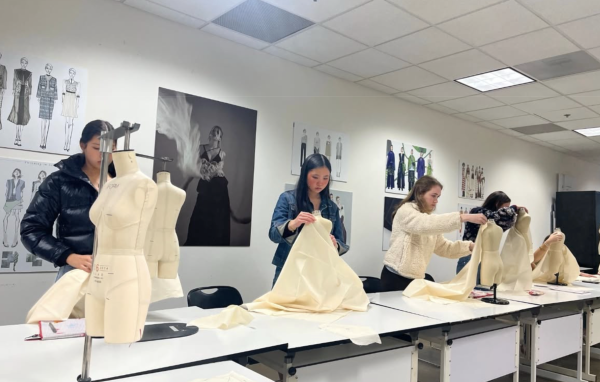Students perform The Crucible, draw enthusiastic crowds
The Westminster players relived a historic tale of fear, betrayal, and death through The Crucible, a play about the Salem witch trials in 1692. Directed by guest artist and Westminster alumnus Celia Quillian, the performance ran on Oct. 28 and Oct. 29. During the time of colonial New England, settlement in America had not yet expanded to the West. Living in an unknown land also meant exposure to foreign diseases. The strict moral and religious rules of the Puritan community in Salem combined with the fear of the unknown heightened the anxiety in the village, and the villagers turned to witchcraft as an explanation for their troubles. The play was written by American playwright Arthur Miller during the Cold War as a parallel to McCarthyism, a term derived from a campaign led by Senator Joseph McCarthy to search for suspected communists in the United States. The term refers to unjustified investigations and accusations made without proper evidence. The heavy historical significance of the play was what made The Crucible a distinctive performance for many of the students.
“I’d say what’s different about The Crucible is it carries a message,” said junior Andrew Oglesby. “There are a few sociopolitical aspects, and it was made in the 1950’s. It carries a lesson about unnecessary accusations, or prejudice or vengeance. It also has a darker tone than most plays I’ve done.” For Quillian, researching and teaching the history of The Crucible made directing it more worthwhile.
“It was really fun to work with that script,” she said. “It let me hunker down and explore that text, and now I’m really excited, personally, about other plays that are set in a historic time period and based off historic events. Something that I love most about directing is doing the back research for it.” Quillian graduated from Westminster in 2010, and returning to the school to direct a play renewed old memories.
“Just being able to direct in a place where I started doing theatre was crazy, and I was very proud of it,” she said. “The students, I think, still remain consistent with the work ethic that Westminster had Their willingness to learn and to try new things and to actually be invested and explore [The Crucible], which isn’t even for a grade, it’s just extracurricular, is a huge Westminster thing that isn’t necessarily found in all high schools.”
From her experience in the Upper School, Quillian also knew that being a student at Westminster meant pressure, academically and socially. So during rehearsals, she packed in fun exercises that not only helped the students learn their parts, but also made the long rehearsal process more enjoyable. In addition, Quillian had the students rehearse the play several times by improvising their lines before they had them memorized. This way, the students could better understand the language of late 17th century.
“Of course she wanted us to get to the important stuff about The Crucible, but she made sure that we had fun during that process,” said freshman Saanya Kapasi. “She let us do comedic, soap opera, over-dramatic, and musical run-throughs. We were able to find bigger, better choices for our characters that made the show more entertaining.”
Being a freshman, this was Kapasi’s first play with the Upper School. With The Crucible, her high school theatre career began on a more serious tone, which also marked the heightened rigor of high school theatre.
“[In] Middle school, you have a lot of kids who are trying [theatre] to see if they like it,” she said. “In high school, you have kids who really care about theatre, not necessarily looking into it as a career, but with that kind of intensity. I think it was a great first production to do in the high school, and I’m really proud of the part I got.”
In the play, Kapasi plays Ann Putnam, the wife of Thomas Putnam, one of the wealthiest people in Salem. But despite her affluence, she endures a very personal loss—seven of her eight children die after birth. Furthermore, her only remaining daughter becomes ill. In her sorrow and desperation, she blames witchcraft and demonic forces for her loss.
“I think she harbors a lot of guilt because of that,” said Kapasi. “I think she’s also a little bit shallow in the sense that she believes anything and everything, so she fully invests in witches and demonic arts. It’s almost as if she believes more in witches than she believes in God.”
Similarly, Oglesby’s character, Reverend John Hale, devotes much of his energy to investigating witchcraft. In the play, Hale wants to bring the justice of God through condemning witches, but as more and more innocent people are being accused, he realizes the corruption of both the court and the justice system. For Oglesby, Hale’s strong sense of religious and moral obligation made the role sometimes difficult to portray.
“Hale, in my opinion, is a zealot, and while I consider myself to be a man of religion, I’ve never actually been so emotionally driven in that sense,” said Oglesby. “I’ve never been driven to that kind of anger. I actually had to portray [Hale’s] anger now and then, serious frustration at seeing God’s justice obstructed.”
As a man of high moral integrity, Hale’s only motive is to administer justice and to serve God, which sets him apart from characters like Abigail. Abigail, played by junior Caroline Stewart, was a former maid of John and Elizabeth Proctor, until she was disgraced and fired for having an affair with John Proctor. In seeking vengeance, she accuses innocent people of witchcraft and gains power in the town and the court. Consequently, Abigail’s antagonistic qualities presented a challenge for Stewart.
“I’ve never played an evil person before,” Stewart said. “I think in order to do that, I found a trait that was similar [between us], which was being determined. She’s very determined to get her way, and that’s to end up with John Proctor, and she’s willing to do anything and everything to get that, so she wouldn’t take no for an answer.”
Power and influence drives other characters as well, such as Deputy Governor Thomas Danforth, played by senior Lauren Mobley. Danforth was the chief judge of the court and was responsible for convicting the villagers of witchcraft. Danforth holds the court’s authority in high regard, and never changes his verdict despite the lack of evidence. He refuses to suspend the witch trial hangings in fear that his own authority would be questioned.
“Danforth is supposed to be the person who is trying to do what’s best for the country and what’s most lawful, but he becomes a villain whose intentions are good, but who also wants to just cover himself up,” said Mobley. “In my opinion, I think he’s just trying to make sure he can maintain his power and not be changing. If he changes, it looks like he’s weakened or he was wrong, which discredits his reputation and it gives power to the people he doesn’t necessarily want to give power to.”
While the whole town is engrossed in fear, John Proctor, played by junior Ryan Costley, is one of the only characters who does not believe in the existence of Satanic arts. He is outspoken about his beliefs and questions the veracity of the court and the trials themselves.
“The biggest theme he raises is about understanding the whole story before you make assumptions, but also the idea of the scapegoating of people, people being blamed for something they’re not involved in, and people getting scared and therefore targeting other people about those fears instead of assessing why those fears exist,” said Costley.
In the play, fear has a death count. In total, 19 people are hanged for not confessing to witchcraft. What made The Crucible a difficult production for some of the students was the sheer number of lives lost and the staggering consequences of misguided fear.
“While a few of us have lost family members, loved ones, or a few of us have experienced disappointment, we have bad grades every now and then, or losing something, we’ve never quite felt anything of that magnitude, so much death and despair, so much destruction, so much unnecessary loss,” said Oglesby. “Having to portray that kind of tragedy and despair was difficult for all of us.”
The overarching themes in The Crucible of groundless accusations, morality, and fear don’t just apply to witch trials. They have been relevant throughout history, and are still relevant today.
“This play was written during a time of political disarray, and it is often put on during times of political disarray,” said Quillian. “In this particular election cycle, no matter what side you’re on, I think we can all agree that there’s been a lot of finger-pointing from the beginning. There was a lot conspiracy-throwing, people making up things on the Internet, people feeding off of false news of every side.” Thus, even though The Crucible may seem archaic and removed from our time, the message still pertains to a modern audience.
“It’s a piece that the audience can reflect on,” said Mobley. “This [event] happened in history, what’s happening now that’s similar to this, and how can we prevent this type of result from happening?”



